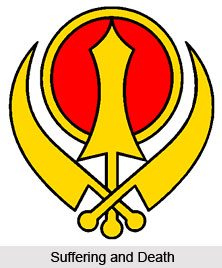 The concept of Suffering and death has been mentioned quite often in many of the Holy book of the Sikhs. Suffering mentioned here is about the inner suffering. According to Guru Nanak Dev, the Creator has caused this suffering and it can be cured by him only. Human beings can be cured by repeating God`s name and meditating on Him. Spiritual Suffering has been experienced by Guru Nanak Dev and therefore it is the major concern of the Sikh religion. Guru Nanak has made several references to different kinds of suffering in his hymns. According to him `pleasure and pain` have come through God.
The concept of Suffering and death has been mentioned quite often in many of the Holy book of the Sikhs. Suffering mentioned here is about the inner suffering. According to Guru Nanak Dev, the Creator has caused this suffering and it can be cured by him only. Human beings can be cured by repeating God`s name and meditating on Him. Spiritual Suffering has been experienced by Guru Nanak Dev and therefore it is the major concern of the Sikh religion. Guru Nanak has made several references to different kinds of suffering in his hymns. According to him `pleasure and pain` have come through God.
Pride is considered as the root cause of suffering. In some of his hymns, he compares human beings with a bride whose husband has isolated her; because of this `separation` the human being suffers. Lust is also considered as another reason for suffering. War and political greed has been responsible for the suffering of people. Pride of human beings is considered as one of the root causes of human suffering. Over indulging in worldly pleasures results in various diseases which can cause pain and suffering.
He also speaks about the general nature of suffering in many of his hymns. Only faith in God can enable one to overcome the suffering. The grace of God is the means of rescue from all kinds of suffering. He has adviced his followers to treat both `pain and peace alike` in order to stay balanced.
There are two aspects of death in Sikhism `death` has two aspects. One is that human beings have to reach their final destiny through union with God. This aspect is positive in nature as it means the end of earthly suffering which one faces during this earthly life. The other aspect of doing is that human beings are led into coming and going into this earthly life.
The best description of the first type of death is given in the text of the funeral prayer of Sikhism. It has five hymns three by Guru Nanak Dev, one by Guru Ram Das and one by Guru Arjan Dev. It has been said that real death is an occasion to rejoice and not to be sad.
The second aspect of death is about coming and going into life again and again. The Sikh religion fully recognizes the theory of transmigration of souls. According to Sikhism, human beings remain in the confinement of the cycle of life and death known as transmigration. Guru Nanak recognizes that a person is responsible for the captivity of cycle of transmigration.
Meditating in God`s name is a method to overcome the cycle of death. Guru Nanak has stressed the role of the Guru. Finally he has laid special stress on the grace of God, which makes it possible for a person to get out of captivity of the cycle of birth and death and finally unite with God.




















